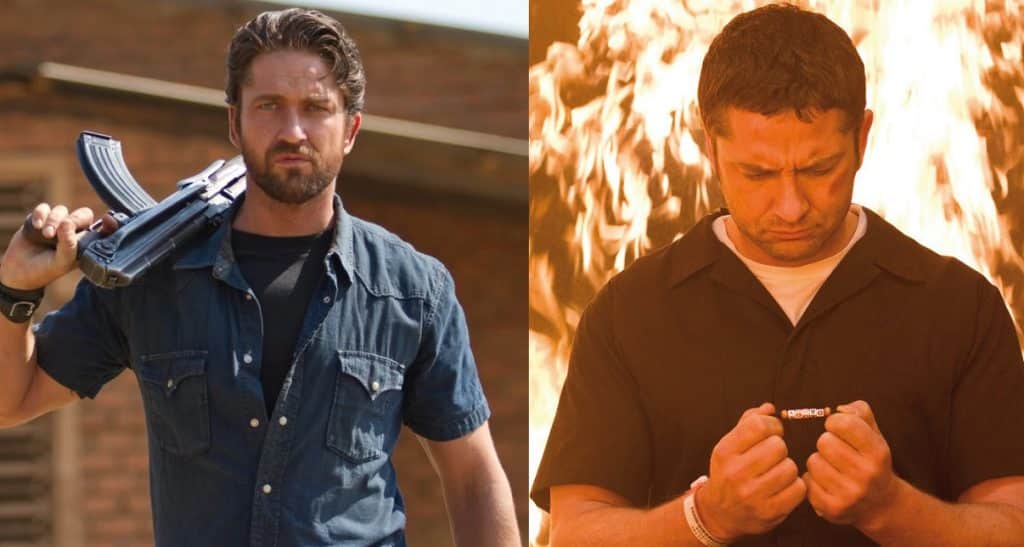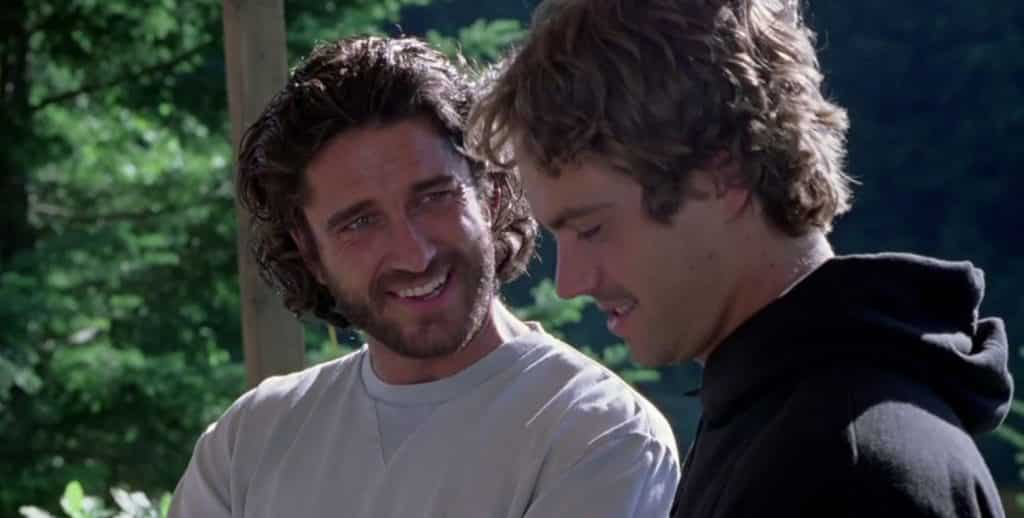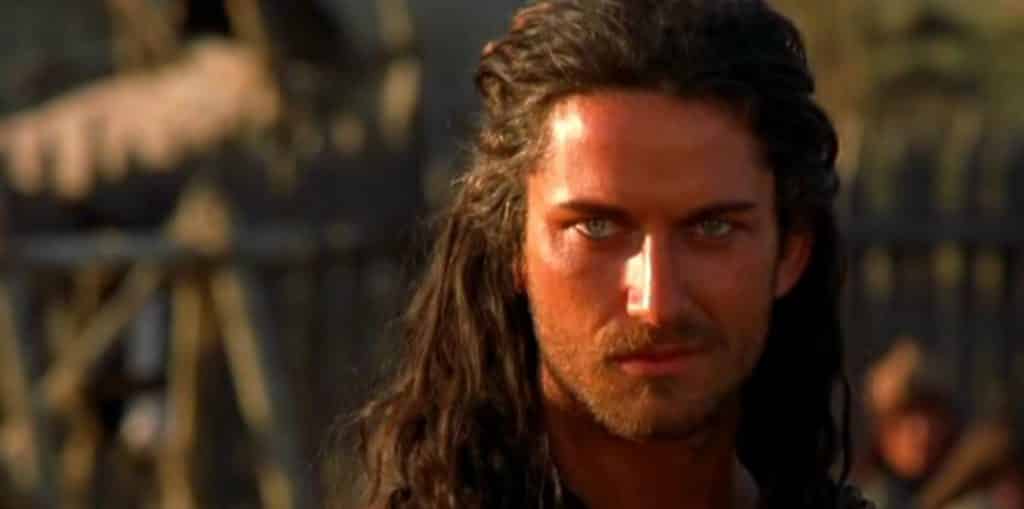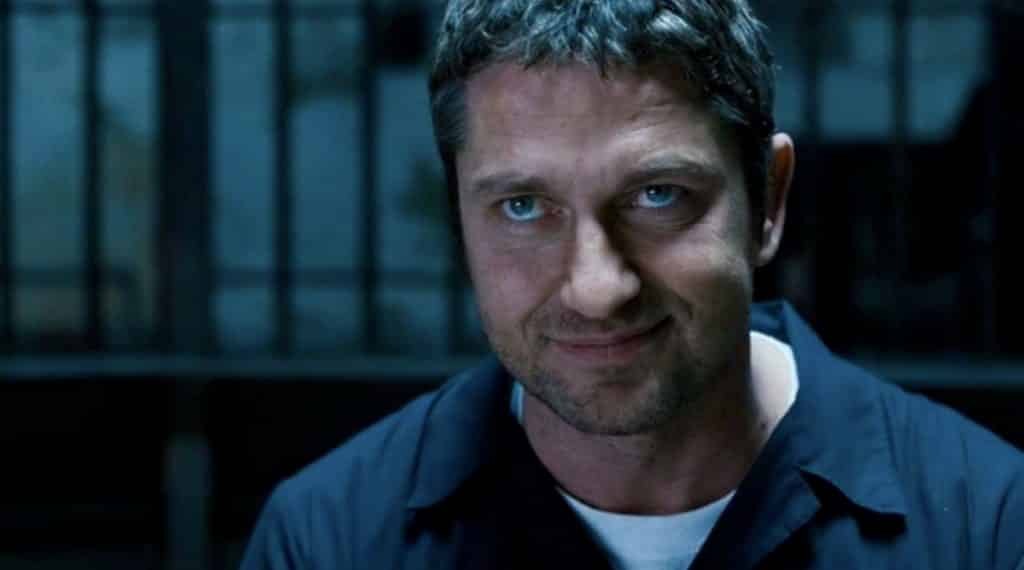Gerard Butler has had an eventful life. The ruggedly handsome Scotsman started his professional life as a lawyer, but dissatisfaction and self-doubt led him down the dangerous road of alcoholism. Fortunately, within a few years, he had discovered acting, renewed his passion for life, and sobered up.
What followed has been an interestingly varied career. Action, comedy, romance, horror, children’s, and sci-fi. Truth, fiction, period pieces, historical epics, modern biopics, and brilliant comic adaptations. Silly chick flicks, testosterone-fueled war games, and singular versions of iconic characters. The Phantom of the Opera, Attila the Hun, Dracula, and Beowulf. Shakespearean generals, animated Vikings, time travelers, dragon hunters, mercenaries, gangsters, cancer patients, and jurors.
If you didn’t know him before 300, you certainly did after. Butler’s brilliant turn as Spartan king Leonidas made him a household name. Since then, he’s made good (Rocknrolla, Chasing Mavericks, Coriolanus) and bad (Movie 43, Gods of Egypt) choices, but his trajectory has never been boring.
We’ll next see him in this weekend’s Geostorm, which looks to be a fun disaster flick, in the vein of The Day After Tomorrow and 2012. (I don’t know about you, but I *love* a good CGI destruction of earth.) Whether this will fall into the good or bad column remains to be seen. While we wait, let’s take a look back at a few of the highlights of Butler’s filmography.
Timeline (2003)
Based on Michael Crichton’s novel of the same name, it so disappointed the author that he refused to allow any more of his books to be adapted to film. So why include it on this list, you ask? Because it’s a movie that thinks it’s serious, but is actually the fun, cheesy kind of awful. And its one saving grace is the performance of Gerard Butler as Andre Marek. This movie shows just how much Butler can elevate substandard material. The other films on this list range from good to great, but Timeline is just ok. Without him, it would be straight up bad.
Andre Marek is the assistant to Professor Edward Johnston, who specializes in medieval European archaeology. The two educators and their students, along with Johnston’s son (a terribly wooden Paul Walker, God rest his soul), are on a dig in France. Some poorly explained shit happens, sucking the good professor back to 1357. So of course, the only logical course of action is for *all* of them to rocket themselves off to the 14th century as well to retrieve him.
Millennium gaps and language barriers are no match for these intrepid young scholars. They find Johnston easily enough, but the tough part is getting back to the present – and doing so without changing history. History, however, is going to change them.
It’s a brilliant book, and could have been a damn good movie. Unfortunately, studio interference chopped the director’s vision to pieces, and poor casting meant the film had a thoroughly uninteresting lead. (To his credit, Walker’s acting did improve as his career went along. But he’s a charisma vacuum in this one.)
It’s Butler’s subplot, in which Marek learns that he may have been destined to end up in 1357 all along, that carries the film. He’s incredibly earnest, charming, and honorable, and the chemistry with his leading lady sparkles from the screen.
If you want some good, silly, popcorn fun, check this one out. Suspend disbelief before you press play, and I think you’ll enjoy it.
Attila (2001)
In just his second leading role for American audiences, Butler took on the heavy role of the legendary barbarian king, Attila the Hun. Shot as a miniseries for the USA network, it chronicled the warlord’s life, from the death of his parents when he was young, to his own death in 453 AD, at the age of 47. In between, he unites the Hun tribes and conquers most of eastern Europe, before setting his sights on the lofty goal of the Roman Empire.
Most of us briefly learned about Attila in high school history class, but that was generally limited to his military campaigns. We know little about the man himself. So this account, however “Hollywooded” (i.e. embellished) it may be, is quite entertaining, as it presents a new point of view for many viewers.
Boasting a stellar cast, including Powers Boothe, Tim Curry, Alice Krige, and Tommy Flanagan, the three-hour epic displays Attila’s military prowess, diplomatic strategies, and his way with the ladies (the exact number is unknown, but the voracious Hun is said to have had many wives at the same time, adding to his collection periodically).
The climax of the film covers his mysterious death, on the night of his latest wedding. How he died has been a matter of debate for over a thousand years, with theories ranging from poisoning to stabbing to alcohol overdose. This film takes the poison route (quite logical, given the known facts), blaming none other than the Hun king’s blushing bride.
It’s a shocking end to a dramatic life – a life that Butler portrayed far better than he should have, given his relative inexperience in front of the camera. He brings a dry figure from dusty old books to vibrant life, showing how a man could be so loved by some and so hated by others. To be made for TV, this is a very high quality production.
Machine Gun Preacher (2011)
In this gripping true story, biker gang member Sam Childers is fresh out of prison. He’s shocked to find out that his wife waited for him, is no longer a stripper, and has turned her life over to Jesus. It’s a lot to take in, and for a while, he’s merely humoring her. However, after a carjacking in which he is nearly killed, Sam decides to take her up on her offer to accompany him to church. There, he decides to be baptized.
This is a huge turning point in Sam’s life. He’s done with crime and drugs; now, he wants to devote his life to helping people. But he’s unsure of exactly how until he meets an African pastor. Hearing the plight of the Sudanese people, he decides to travel there to see if there’s anything he can do for them.
If he expected this to be an ordinary mission trip, he was wrong. Only upon seeing the devastation with his own eyes does he truly understand what the citizens of the war-torn nation are forced to endure. The last straw is when he realizes that village children, some as young as 8 years old, are spared from the massacres of their families – only to be pressed into slavery as soldiers. Forced to kill the innocent. Strangers, friends, even relatives. It’s a barbaric practice, and he decides then and there to put a stop to it by any means necessary.
Sam makes several trips back and forth to Sudan, risking his marriage and even his life to help the horribly oppressed people. He constructs orphanages to keep them safe, arms them, and teaches them how to defend themselves. He also brings the gospel along with him, so the Sudanese can take comfort in knowing there is something after this horrific life. It is through these incongruous contributions that he becomes known as the Machine Gun Preacher. He then leads his young army on a desperate mission to rescue the kidnapped children.
Sam Childers himself advised Gerard Butler on the film, to bring his story to life as accurately as possible. Not shying away from the ugly, shameful parts; nor heaping on credit for his selfless efforts. He simply tells it as it was. And Butler believably covers the raw emotions involved. Regret, fear, rage, powerlessness, and redemption are all integral parts of Sam’s harrowing life story, brilliantly told in this biopic.
Law Abiding Citizen (2009)
My husband and I saw this in the theater on one of our first dates, and he still calls Gerard Butler “Steakbone” to this day. If you’ve seen it, you know why.
After Clyde Shelton’s wife and daughter are brutally murdered in a violent home invasion, the perpetrators are caught, charged, and put on trial. A broken man, Clyde’s only comfort is knowing that the ruthless killers will be brought to justice.
But it doesn’t go down like it should. A legal technicality nullifies the physical evidence; only circumstantial remains. Backed into a corner and desperate to put away at least one of the murderers, the DA offers a plea bargain. One of the pair agrees to testify against the other, in exchange for leniency. One goes to death row, but the other gets a light sentence for his testimony.
Fast forward ten years. It’s finally execution time for the killer on death row. Lethal injection is meant to be a painless death, but something goes very wrong. A slow and gruesome demise follows. Is it simply karma at work? Or did someone want to ensure the guilty would suffer?
Meanwhile, the second killer is now a free man. He soon wishes he’d stayed in prison, however, once Clyde gets his hands on him. The vengeful man sets out to put his captive through the same terror and agony his wife and daughter felt. In a long, incredibly disturbing scene, Clyde slowly, meticulously tortures the murderer, before finally dismembering him.
If you think vigilante justice has been served, and Clyde can now move on with his life, think again. He’s just getting started. He blames the entire legal system for not punishing the killers as harshly as they deserved. The murderer’s body is found (all 25 pieces of it), and naturally, Clyde is the prime suspect. He cooperates fully with his arrest.
Surely, once he’s securely in jail, he can’t exact any more revenge, right? Wrong. One by one, the rungs of the judicial ladder are punished for their incompetence, in brutal, brilliant ways. No one can figure out how Clyde is carrying out his gruesome vengeance from inside a jail cell. But if the district attorney doesn’t put the pieces of the puzzle together quickly, he’ll be the next victim of vigilante justice.
Clyde is simultaneously protagonist and antagonist, and Butler expertly conveys all aspects of the complicated character. Happy family man; grieving husband and father; broken; betrayed; soulless instrument of twisted vengeance. It’s a terrifying descent, and he conveys it seamlessly.
This is a film that will stay with you long after it’s over. It will give you pause to think about truth, fairness, justice, karma, and how far you would be willing to go to avenge the ones you love.
The Phantom of the Opera (2004)
In quite possibly the best performance of his career, Butler shocked everyone with not only his acting skills, but also his vocal abilities. The film is an adaptation of the longest-running, most successful Broadway musical of all time (which, in turn, is based on Gaston Leroux’s 1909 novel).
Now, before you scoff at “musical,” hear me out. I hate them too, as a general rule. But there’s just something about this one. Actually, there’s *everything* about this one. The brilliant acting and singing; the beautiful sets; the opulent 1870s period costumes; the flawless script; and of course, the music. Good lord, the music. It’s the only film soundtrack I own.
The filmmakers – including director Joel Schumacher and original composer Andrew Lloyd Webber – searched far and wide for the perfect cast. For Christine Däae, they found 17 year old opera phenom Emmy Rossum. For her hero, Vicomte Raoul de Chagny, talented Broadway veteran Patrick Wilson was cast. Supporting roles were filled by the likes of Miranda Richardson, Cíaran Hinds, Simon Callow, and Minnie Driver.
But it was the Phantom himself who would make or break this long-awaited adaptation. Many actors were considered, including Hugh Jackman, Antonio Banderas, and the late Heath Ledger. But finally, it was Butler’s rakish appearance and rough, rock n roll voice that won the filmmakers over. He had no formal musical training; his only experience was singing for a rock band in college. Nevertheless, Webber said Butler was exactly what he had always imagined the Phantom to sound like.
Performing some of the most famous songs in all of musical theater was a very tall order for the untrained singer . But he pulled it off valiantly, only needing digital assistance for a single long-held note at the end of “Music of the Night.”
But aside from the vocal challenges, another obstacle was acting with only half of his face. As the disfigured genius living beneath the Paris Opera, Butler spent the entire production with his visage obscured by prosthetics and a mask. It greatly reduced the ability to express emotions with facial expressions, which necessitated the ability to emote with only his voice. He did so brilliantly, conveying the Phantom’s loneliness, anger, fear, tenderness, rage, and heartbreak.
I fully believe that no other actor at the time would have played this role as exquisitely as Gerard Butler did. It’s a flawless film, from start to finish.
Which of these films did you love? Which have you never seen, but plan to check out now? And which do you think should have been included in this list? Tell us your thoughts in the comments!






